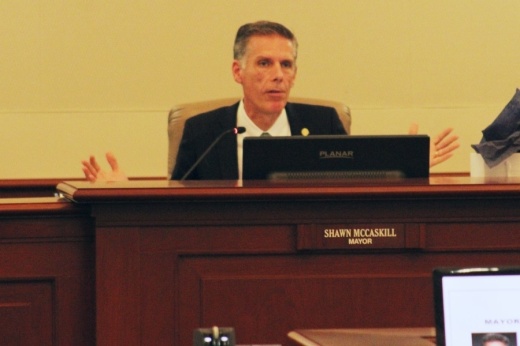During the June 4 City Council meeting, a split decision led to the developer asking for more time to decide the next steps for the project. The plans called for eight office buildings and 56 residential dwellings on 21.55 acres of the land. The remaining acreage is in the flood plain and cannot be development, according to city staff.
The vote on the current land use designation, which would change from industrial to mixed-use, passed 5-1, with Deputy Mayor Pro Tem Kathy Talley voting no.
The second vote entailed changing the zoning from agricultural to a transitional zoning district. The results of that vote were tied 3-3 with Talley, Frances Scharli and Mayor Shawn McCaskill voting no. Council member Amy Torres-Lepp was not present at the meeting, which led to the deadlock margin.
In response, applicant Martin Schelling asked for the item to be tabled until the Aug. 6 meeting to review plans for the property. Schelling indicated he would look into industrial options in the area to maintain the land use. After he requested to table the vote, council voted to erase the earlier votes on the project.
The background
Wright Brumlow East Real Estate owns the 32.8-acre property and asked for two changes to the land located near Brumlow Avenue and East Continental Boulevard.
The location features residential homes that would’ve been torn down to make way for the proposed development.
The residential plan was decreased from 94 possible houses to 56 to address density concerns, Curtis Young from Sage Group said.
The commercial side of the development would feature 70,000 square feet of office and warehouse space, which would front Brumlow Avenue.
The details
The overall council meeting lasted nearly four hours, and almost three hours was devoted to this project. A number of people spoke in opposition of the development, citing traffic issues along Brumlow Avenue and Continental Boulevard in the morning and evening rush hour times.
Within 300 feet of the proposed development, the city received two residents in support and 13 against the development prior to the meeting.
The city has the expansion of Brumlow Avenue on the long-term project list, and McCaskill said the project could cost upwards of $30 million. Public Works Director Rob Cohen said that project could start as early as 2027 but could start in 2029. McCaskill said the timeline is dependent on money and if the city would need to seek additional funding from the state or federal government.
“You aren’t the problem,” Mayor Pro Tem Randy Williamson said to Schelling. “You are not asking for anything different than anyone else the last 30 years; you happened to be the last piece. You could argue the residential [traffic] could be a little more of a challenge. But light industrial is going to be all day, every day, and you're talking tractor trailers, box trucks, delivery trucks, trucks with trailers on the back of them. And so at least my position on this is that the industrial use is worse for contributing to the traffic.”
Zooming in
Schelling was asked by council to consider trimming the housing development portion down to provide bigger lot sizes to match adjacent developments but did not take to the idea.
“We run numbers, and we are happy; we think we will make a reasonable profit but not a killing,” he said. “That is why we brought it forward this way. We brought forward something practical and reasonable on our end that we could live and what the city could live with. If we whittle more on residential, it doesn’t make sense. This is the third rendition of this. We worked hard to make this work.”
Schelling said construction of houses and buildings were still two to three years away, if approved. With some of the land being in a floodplain, the Federal Emergency Management Agency would have to provide clearance for the project in addition to council.
Quote of note
“We have an opportunity to take it down from industrial, whether fuel tanks or warehouses; I'm in favor of the residential development. Of course, the devil's in the details,” McCaskill said. “We have to get it right, and so points taken from everyone in the audience and those who have submitted comments.”





